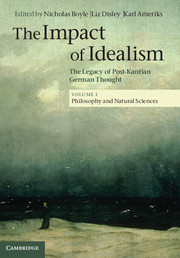Book contents
- Frontmatter
- Contents
- List of Illustrations
- List of Contributors
- Acknowledgements
- List of Abbreviations
- Foreword
- General introduction: the eighteenth and nineteenth centuries
- General introduction: the twentieth and twenty-first centuries
- Introduction: Idealism in the natural sciences and philosophy
- 1 Philosophy of natural science in Idealism and neo-Kantianism
- 2 The impact of German Idealism and Romanticism on biology in the nineteenth century
- 3 The unconscious: transcendental origins, Idealist metaphysics and psychoanalytic metapsychology
- 4 Nietzsche, Kant and teleology
- 5 Transcendental idealism, phenomenology and the metaphysics of intentionality
- 6 Heidegger and the impact of idealism
- 7 French Hegelianism and anti-Hegelianism in the 1960s: Hyppolite, Foucault and Deleuze
- 8 Scottish Idealism
- 9 ‘My station and its duties’: social-role accounts of obligation in Green and Bradley
- 10 Idealism and the origins of analytic philosophy1
- 11 Idealism and Pragmatism: the inheritance of Hegel's concept of experience
- 12 Reason's form
- Bibliography
- Index
- References
4 - Nietzsche, Kant and teleology
Published online by Cambridge University Press: 05 December 2013
- Frontmatter
- Contents
- List of Illustrations
- List of Contributors
- Acknowledgements
- List of Abbreviations
- Foreword
- General introduction: the eighteenth and nineteenth centuries
- General introduction: the twentieth and twenty-first centuries
- Introduction: Idealism in the natural sciences and philosophy
- 1 Philosophy of natural science in Idealism and neo-Kantianism
- 2 The impact of German Idealism and Romanticism on biology in the nineteenth century
- 3 The unconscious: transcendental origins, Idealist metaphysics and psychoanalytic metapsychology
- 4 Nietzsche, Kant and teleology
- 5 Transcendental idealism, phenomenology and the metaphysics of intentionality
- 6 Heidegger and the impact of idealism
- 7 French Hegelianism and anti-Hegelianism in the 1960s: Hyppolite, Foucault and Deleuze
- 8 Scottish Idealism
- 9 ‘My station and its duties’: social-role accounts of obligation in Green and Bradley
- 10 Idealism and the origins of analytic philosophy1
- 11 Idealism and Pragmatism: the inheritance of Hegel's concept of experience
- 12 Reason's form
- Bibliography
- Index
- References
Summary
The life sciences, in the nineteenth century as much as today, have to operate with the assumption that something like ‘life’ actually exists. Living things have a metabolism, at least potentially so, which incorporates material from their environment and transforms such material into energy. In principle, living things have the ability to grow and reproduce, although this is not a necessary characteristic. Life, it seems, has something to do with change; it exhibits a dynamic of development that includes its own decay. Philosophical discussions of organic life, thus, inevitably encounter the problem of teleology. This certainly has been the case in German Idealism's encounter with living things and their developmental history – from Johann Friedrich Blumenbach's notion of a Bildungstrieb, or formative drive, to the discussions of organic development by Kant, Hegel and Schelling. At the same time, Kant already pointed out, quite rightly, that the presumed directedness of development in nature can only be regarded as a regulative principle. Teleology could not seriously be considered constitutive of nature. Nevertheless, even though animal morphology and cell theory, as much as natural selection and evolutionary theory, from the middle of the nineteenth century onwards largely rejected teleological models of nature on empirical grounds, it is not difficult to see that many of the explanatory models of these new life sciences continued to rely on the language of teleology. Organs and organisms performed specific functions. Biological traits were the outcome of specific law-governed and causal relationships. Beehives were built to perfection. Against this background, Friedrich Nietzsche regarded teleology and causation as the two most problematic aspects of the natural sciences in the nineteenth century. To be sure, it seems counter-intuitive to assume that Nietzsche adopted a position that could reasonably be labelled teleological. This is particularly obvious in his mature philosophical thought. One of the most central statements in Die fröhliche Wissenschaft (The Gay Science, 1882–1887), for instance, directly rejects any teleological understanding of the natural world: ‘The total character of the world…is for all eternity chaos, not in the sense of a lack of necessity but a lack of order, organisation, form, beauty, wisdom, and whatever else our aesthetic anthropomorphisms are called.’
- Type
- Chapter
- Information
- The Impact of IdealismThe Legacy of Post-Kantian German Thought, pp. 166 - 190Publisher: Cambridge University PressPrint publication year: 2013
References
- 2
- Cited by



